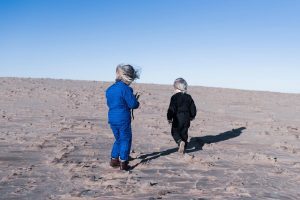Twenty years ago, Adam Morgan, co-founder of strategic brand consultancy eatbigfish, coined the term ‘challenger brand’. Challenger thinking and behaviour is eatbigfish’s bread and butter, and thus were the perfect partners for PHD to collaborate with on two thought leadership publications, 2012’s Overthrow: 10 ways to tell a challenger story and last year’s anticipated follow-up Overthrow II: 10 strategies from the new wave of challengers.
As the world continues to change at lightening-fast speed, so do the challengers. eatbigfish have researched and compiled their annual list of challenger brands to watch in the year ahead. In a volatile world, many of their picks this year are tackling the climate crisis in big and small ways.
Here’s a look at three of the challenger brands to keep an eye on in 2020. The full list of challengers to watch is available here.
OLIO
OLIO is tackling the global issue of food wastage by tapping into the sharing economy and trying to normalise sharing perfectly decent but unwanted food. Share more and waste less – a very simple message with potentially huge benefits.
OLIO is an app, founded in 2015 by Tessa Clarke and Saasha Celestial-One, that allows people and businesses to share surplus food rather than see it go to waste. Their mission is to ‘to eliminate avoidable food waste in the home and the local community’.
The food-sharing startup has now raised over $10m in funding, has 1.7m users across 49 countries and recruited over 40,000 super-fans to help them on its mission. Rather than lead with the environmental case, OLIO is taking its message to communities with a simple provocation – when did sharing food become weirder than wasting it?
Click here to read the rest of Ben Cooper’s (Strategy Director, eatbigfish) report on this Challenger to Watch.
HIREUP
The founder of Hireup, Jordan O’Reilly, experienced Australia’s failing and inefficient disability support system firsthand. Support workers were an ever-revolving door for his younger brother Shane living with cerebral palsy. His family – and most importantly, Shane – had no control over who would arrive at their home on any given day. It was a system equally disempowering for support workers.
Jordan asked himself why the rising capability of matchmaking technology couldn’t be applied to disability support.
The result in 2015 was Hireup – a for-purpose business centred on a digital platform which focuses on building real relationships with connection first, care later. And with this philosophy, Hireup has created 35,000 support connections, facilitated 3.6m hours of support and saved its users $27.4m.
Click here to read the rest of Cecelia Hund’s (Strategy Director, eatbigfish) report on this Challenger to Watch.
PETIT PLI
Petit Pli is a wearable technology company. After being frustrated with gifted clothing quickly becoming too small for a newborn nephew, graduate Ryan Mario Yasin founded Petit Pli in 2017 to address the problem. Ryan’s Royal College of Arts aeronautical engineering studies inspire Petit Pli’s designs.
The fashion industry is the second-largest polluter in the world and fast-fashion became a talking point in 2019. Petit Pli challenges this throwaway culture in childrenswear. Using recycled and recyclable materials, manufactured in a factory powered by solar panels and creating less clothing waste – Petit Pli has sustainability at its heart, driven by the belief that slow-fashion is the future.
As part of its broader social ambition, Petit Pli hopes to highlight the importance of durability and long-termism of clothing as something children then carry forward into their adult life.
Click here to read the rest of Ellie Simmons’ (Strategist, eatbigfish) report on this Challenger to Watch.






